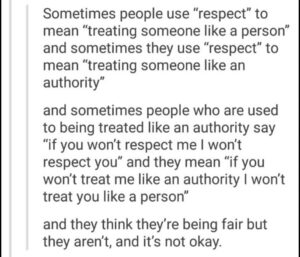If you prefer to listen to this blog post, click here.
A lot of clients over the years have come to us to help them with a laundry list of behavior issues, and on that list is something along these lines:
“My dog doesn’t respect me.”
“My dog respects my spouse a lot better than me.”
“My dog listens to me when it’s just the two of us, but as soon as other people are around they completely lose any respect for me.”
These concerns are completely understandable, especially when so many of the training recommendations on TV and the internet tell you how important it is for your dog to respect you, and how you can’t be a good leader if you don’t command your dog’s respect. That’s a lot of pressure to put on ourselves and our dogs!
But I’m going to let you in on a little secret:
Dogs have no idea what respect even means.
So… what DOES respect even mean?
The tricky thing about expecting a dog to show us respect is that everyone involved has to know exactly what “showing respect” looks like.
I had a conversation with some of my students in our mentorship program about respect a while back, and at the time, several of the students participating in the conversation had young children, ages 3-6. I asked them to ask their children what respect means and to film their responses. The videos were hilariously adorable. One child said, “Respect means… giving respect!” Another child, after a prolonged silence, whispered to her mom, “You say it!” Another said, “Respect is something grownups know.”
So respect is a concept that even children have a hard time understanding, much less dogs. But to be honest, it isn’t really something that grownups know all that much better!
This social media post went viral for the very good reason that it beautifully illustrates how the definition of respect can be slippery even for adult humans:

So kids struggle to define respect, and adults struggle to define respect, but how do dictionaries define respect? Guess what: even dictionaries have multiple definitions!
Merriam-Webster’s definitions include:
- An act of giving particular attention
- High or special regard
- The quality or state of being esteemed
Oxford’s include:
- a feeling of deep admiration for someone or something elicited by their abilities, qualities, or achievements
- due regard for the feelings, wishes, rights, or traditions of others
- admire (someone or something) deeply, as a result of their abilities, qualities, or achievements
Clearly, respect is a complex and nuanced social construct. If humans, of any age, struggle to define it for themselves, does it seem realistic to expect dogs to grasp the concept?
Misunderstanding respect = misinterpreting behavior
But do definitions really even matter, anyway? Lots of people seem to get their dogs to respect them, so does it really matter whether the dog understands what respect means?
Actually, yes!
The problem with trying to command respect from a dog without really being able to define what that looks like is that lots of other things can then look like respect to us. In almost every single dog training video where a trainer points out a dog’s behavior as “respect”, something else is going on instead. And when we misinterpret our dog’s behavior, we are at a much greater risk of responding to that behavior inappropriately.
So what are some common misinterpretations? What’s going on instead?
- One of the most frequent ways we see the word “respect” being misapplied to behavior is when the dog is actually exhibiting some kind of distress–typically fear. Fear is frequently misinterpreted as respect.
- Another common situation in which the word “respect” is misapplied is when a dog is in a shut down state.
- In many cases someone might think that a dog is being disrespectful when they actually have mountain lion brain.
- People also might think a dog is being disrespectful when really the behaviors they’re learning just haven’t been fully proofed yet!
- And sometimes, people say a dog is being respectful when the dog is just really focused on the handler–which is a good thing!
These are just some of the most common ways in which the notion of respect (or disrespect) gets in the way of accurately identifying what’s going on, but of course there are many, many others! So do you see now why worrying about commanding a dog’s respect isn’t a particularly useful way to approach training?
So what do YOU mean when you say your dog doesn’t respect you?
A far better way to solve the problems you’re experiencing in your relationship with your dog(s) is to ask yourself exactly what respect looks like to you. When you find yourself wishing that your dog showed you more respect, think about exactly what they’re doing, and exactly when they’re doing it. Like this:
When [describe the specific context], my dog [describe what your dog does].
For example:
I feel like my dog doesn’t respect me when [I call his name when he’s in the backyard] and my dog [ignores me completely].
Once you’ve identified exactly what you mean when you think your dog doesn’t respect you, you then have a clearer goal to aim for–which can make all the difference!
Now What?
- Use the fill-in-the-blanket method above to identify exactly what your goals are.
- Learn dog body language to more accurately identify what your dog is telling you.
- If you need help clearly defining your goals or figuring out how to more successfully reach your goals, that’s what we’re here for! You can contact us at [email protected] to schedule an appointment.
Be well,
Emily
